On July 9, the 2021 World Artificial Intelligence Conference Themed Forum “Digital Silk Road and the High-quality Development of Cross-border Data Factor Market” was hosted at Shanghai Expo Center, and Hongkou Campus, Shanghai International Studies University (SISU). Zhong Yixin, former principal chairman of China Artificial Intelligence Council and an academician of the Academy of Engineering and Technology of the Developing World, said that the development path of SISU was similar to that of AI.

“We are transforming from the industrial age to the advanced stage of the information age, and the traditional view of science and methodology should be changed, from ‘divide and rule’ to ‘unity of man and nature’, the concept of which is in line with the current research and development needs of artificial intelligence; SISU is also developing from a language university in the traditional sense to a characteristic one of foreign studies based on language, and organically unifying related disciplines, which is the same as the development of artificial intelligence.”
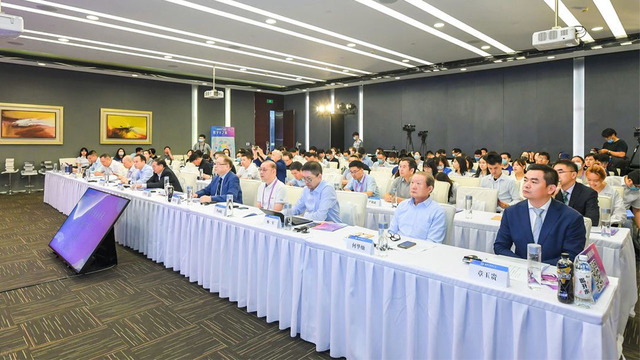
This special forum, an important part of the ecological forum at the main venue of the World Artificial Intelligence Conference, was hosted by School of Economics and Finance (SEF) of SISU, and invited hundreds of top experts in the field of artificial intelligence and guests in the industry to gather together. In-depth discussion was conducted on topics like digital silk road construction, cross-border data factor market development and internationalization of the RMB, new digital infrastructure and national & regional cooperation in Russia, Eastern Europe and Central Asia, and linguistic data science development and modernization of national governance, with the experience of practice and cutting-edge exploration in the industry as well as the latest research wisdom shared. It was committed to promoting the optimization of the comprehensive environment of the digital economy in the countries along the “Belt and Road”, creating a vibrant international digital industry ecology and rendering the forum discussion to play a role in leading changes.
The first batch of new books: China Artificial Intelligence Independent Innovation Research Series, the independent innovation achievement of China’s basic theory of artificial intelligence, was also released at the conference.
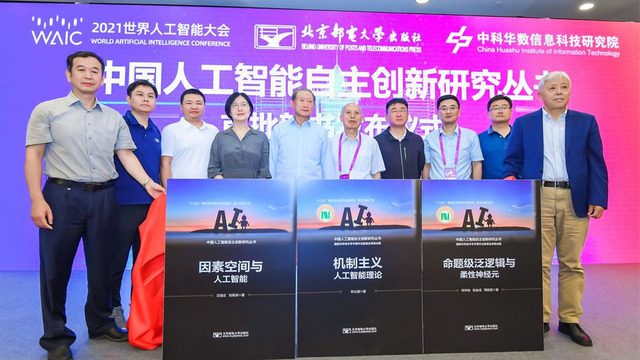
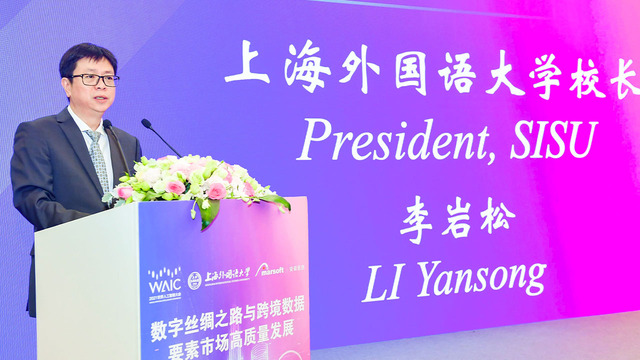
Li Yansong, president of Shanghai International Studies University, delivered a speech at the opening ceremony and pinpointed the forum subjects under discussion that were closely related to the latest progress and research features of SISU’s discipline development. In recent years, SISU has been putting forth great efforts to strengthen its ability to serve China and Shanghai, establishing a high-level research team in such domains as data science and financial big data, linguistic data science and artificial intelligence, computer science and neuroscience, Middle East issues and Sino-Arab relations, the Silk Road Economic Belt, advanced interpretation & translation and interculturalism, and global governance and area studies. This forum reflects the university’s continuous attention to the frontiers of the development of the times and its insight into practical needs.
As the main leading department of the forum, the SEF of SISU boasts the major of “data science and big data technology” and national projects of new engineering research and practice, the key disciplines of which cover economics, management and engineering. And the major has gradually formed new characteristics and advantages of talent cultivation, namely major crossover and advantage complement predicated on data science and big data technology. A group of celebrated experts both at home and abroad gathered at the forum, possessing achievements in the basic theoretical research and cutting-edge technology development of artificial intelligence, digital security and digital economy, and industrial Internet investment. A large number of enterprise representatives and technical personnel were also attracted to participate. Therefore, the forum reflects the combination of production, education and research.
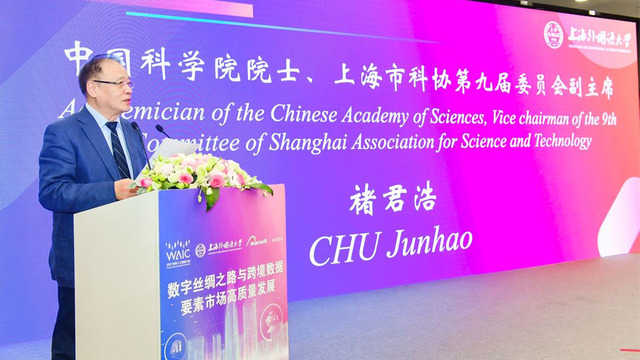
Chu Junhao, an academician of the Chinese Academy of Sciences and vice chairman of the 9th Committee of Shanghai Association for Science and Technology, delivered a speech on behalf of the academicians who were employed by Shanghai International Studies University as adjunct professors of data science and big data technology. He stated that SISU, in recent years, has been making remarkable accomplishments in linguistic data science, financial big data, and the cultivation of special talents, all combined with artificial intelligence; SISU has been fully forward-looking and practical in terms of major setting and talent cultivation, too. The forum can lead the academic community to better think about the deep-seated issues in the digital age and the intelligent era, and jointly look forward to the 21st century picture of the “Digital Silk Road”.
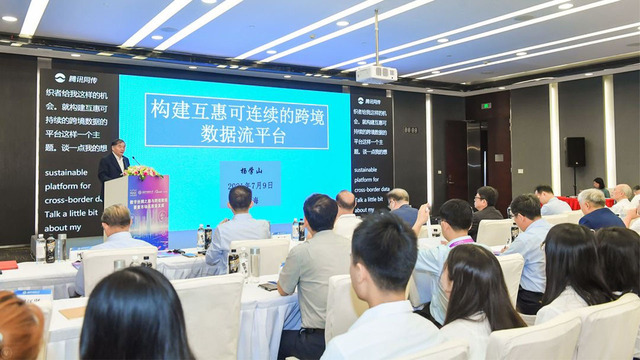
The construction of the cross-border data factor market is the basic infrastructure of the “Digital Silk Road”, and how to establish a feasible cross-border data market is the primary problem to be solved. Yang Xueshan, former vice minister of Industry and Information Technology, delivered a keynote speech on “Building a Mutually Beneficial and Sustainable Cross-border Data Flow Platform”, indicating that for thousands of years, the Silk Road has made extremely important contributions to the development of world civilization, and the Digital Silk Road has served as a bridge for building a community with a shared future for mankind. To develop the digital silk road is to build a cross-border data flow platform, the core of which is to grasp the three key points: “solid foundation, business orientation and forceful empowerment”.
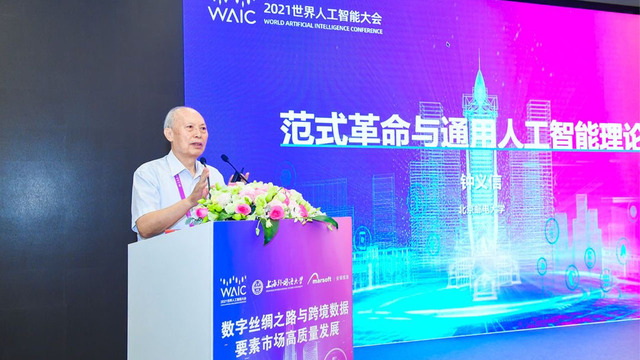
The “Digital Silk Road” must be an intelligent digital road; the cross-border data factor market must be an intelligent transaction market. So intelligence is the symbol of the digital age and the prime feature of artificial intelligence. What is worth pondering is how to understand the revolutionary nature of intelligence along with its development.
Zhong Yixin, gave a keynote speech on “Paradigm Revolution and General Artificial Intelligence Theory”, summarizing the properties and trends of changes in the AI era from a theoretical perspective. As a master in the sphere of AI in China, he believes that a paradigm in philosophy is the research “leader”. Breaking through the limitations of disciplines and chasing paradigms, we cannot stop just at algorithms, computing power, data, and knowledge. Besides, the theoretical performance of general artificial intelligence is comprehensively superior to the current one in several facets: research models, research paths, and decision-making methods.
Li Yuhang, chairman of the United Nations Digital Security Alliance, discussed the theme of “Digital Trust and Security in the Intelligent Age”. He referred to the arrival of the intelligent age with digital transformation. The digital economy is undergoing a transformation from “Mobile Internet” into “Internet of Everything”, and digital technology will become the cornerstone to support the new era of the digital economy: the intelligent age, the value of which lies in data and digital assets. The digital economy must be an intelligent economy, where machines can be trained to replace people and made to run more intelligently. In addition, novel technologies bring new threats as well as opportunities. Because cyber attacks in the Internet of Things era are equivalent to attacks on the physical world, countries around the globe are attaching unprecedented importance to cyber security and cyberspace strategies.
Li Jie, co-chair of the IEEE Big Data Committee and an academician of the Japanese Academy of Engineering, introduced his research results focusing on digital trust and security in the intelligent age. He singled out the problem of data security: there has been existing a lack of trust among IoT devices, and data stored have been at risk of being tampered with and violating privacy; for personal privacy, sensitive data have been susceptible to storage and retransmission by malicious users without authorization. Blockchains in the intelligent era can not only function in finance, but also play a favorable role in network architecture and industrial Internet, thus providing a relatively safe and reliable network architecture.

Zhang Yugui, dean of School of Economics and Finance, SISU, profoundly expounded on the development of green finance and the cultivation of digital finance talents from the perspective of global governance, and presented a keynote speech on “The Trend of Integration of Green Finance Standard and the Cultivation of Digital Finance Talents”. He claimed that global warming has become an established fact, brooking no delay in humans’ taking action to control it. General Secretary Xi Jinping has attached considerable significance to China’s participation in global governance since the 18th National Congress of the Communist Party of China. China upholds the global governance concept of extensive consultation, joint contribution and shared benefit, and will continue to play its role as a responsible major country. China should actively and deeply participate in global governance and implement the “United Nations 2030 Agenda for Sustainable Development”. Since climate change and green transition, for the existing financial system, pose both opportunities and risks, China should especially take the improvement of the green financial system as the top priority in the process of accelerating the construction of a high-standard financial market system.
Under the auspices of Lu Jianxin, co-president of Zhongke Huashu Information Technology Research Institute, experts and scholars also conducted in-depth face-to-face exchanges with the participants through discussion forum. Zhong Yixin, Chu Junhao, Li Jie and other speakers at the plenary session, spoke freely about “Digital Silk Road Construction and High-Quality Development of Artificial Intelligence Industry”, discussed in depth the construction path of the digital silk road, and explored prospectively how to achieve high-quality development of artificial intelligence technology with the panelists: He Huacan, former vice chairman of Chinese Association for Artificial Intelligence; Wang Peizhuang, the founder of theoretical research on artificial intelligence mathematics; Yang Jun, an academician of the Canadian Academy of Engineering; Kang Jincheng, former director of the International Cooperation Bureau of the Chinese Academy of Engineering; Yan Chaobin, director of Beijing University of Posts and Telecommunications Press.
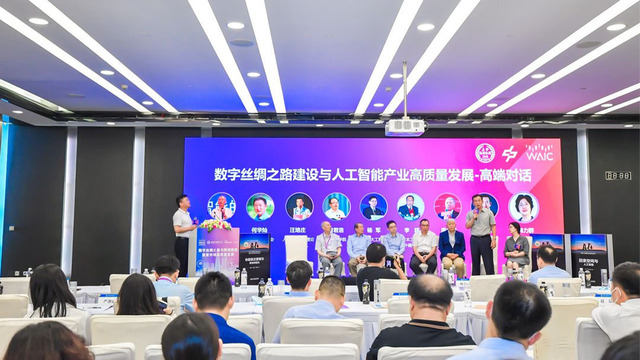
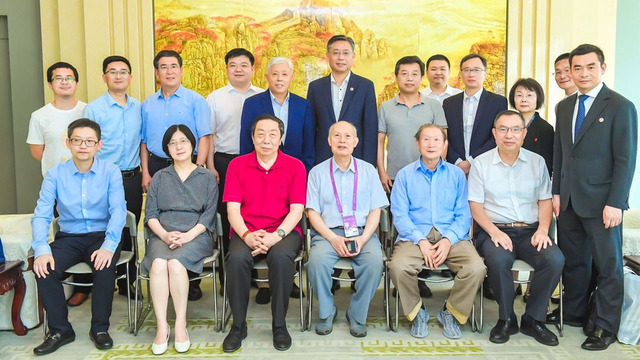
Before the conference of the special forum of the afternoon session at Hongkou Campus, Shanghai International Studies University, Jiang Feng, chair of the University Council, met with distinguished guests.
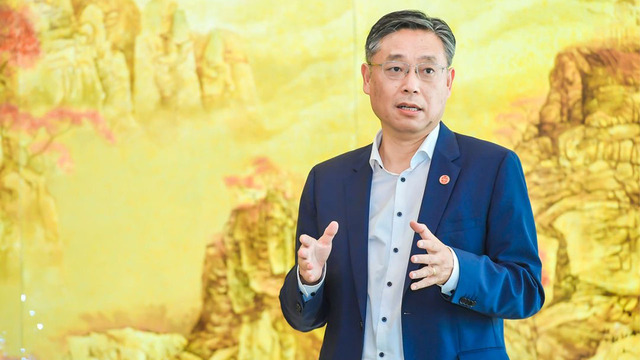
Jiang Feng introduced the characteristics and transformation of SISU, and argued that the disciplines of traditional foreign studies universities have been going through structural changes. In recent years, while not ignoring the true nature of language research, SISU has also strengthened the intersection of majors and disciplines, being committed to cultivating outstanding international talents in multiple languages with political determination, language capability, subject competency and discourse ability. He spoke highly of this forum and looked forward to all the guests’ paying more attention to and rendering support to the construction and development of SISU’s data science and relevant majors in the future.
Zhong Yixin (academician) fully affirmed SISU’s recent years’ practice in school-running transformation and talent cultivation, and shared the paradigm shift in the theory of general artificial intelligence. He suggested that the historical development of SISU had something in common with the evolution of AI. The AI industry, together with SISU has been expected to use the scientific outlook and methodology of the new era in order to promote further development of foreign language higher education and artificial intelligence.
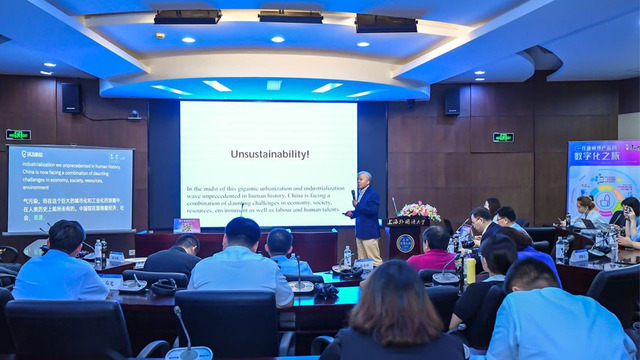
Kang Jincheng, Yang Jun, Shen Jianguang (vice president of Jingdong Technology), Han Yishun (former executive vice president of Institute of Data Science, Tsinghua University), Du Yuejin (chief security officer of 360 Group), Albert Bakhtizin (corresponding member of the Russian Academy of Sciences), Alexander Vasilievich Tuzikov (corresponding member of the Belarusian National Academy of Sciences), Xiong Pujiang (chief architect of COSMOPlat, Haier Group Corporation), Liao Wenjian (chairman of the board of directors in Blue Source Capital), and other honored guests from the globe elaborated their latest research results on cutting-edge topics such as artificial intelligence and the great digital economy development in China, 5G contributing to intelligent manufacturing, data analysis promoting modern “Silk Road” construction, data and artificial intelligence security, etc.

Subsequently, round-table discussions with the theme: “The Cultivation of Data Science and Big Data Technology Talents under the Background of Artificial Intelligence Development” chaired by Zhang Mingqian, director of Big Data and Applied Statistics Research Center in SISU and director of New Engineering Project of the Ministry of Education, and “Language Service from the Perspective of Artificial Intelligence” chaired by Zhang Ailing, Dean of Graduate Institute of Interpretation and Translation, SISU, were carried out simultaneously. Both sites were filled with guests’ witty words and golden sentences which won rounds of applause from the audience from time to time.
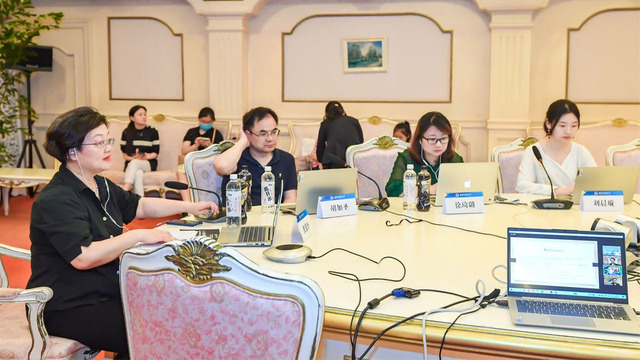
It was reported that Shanghai International Studies University and Shanghai Amarsoft Information & Technology Co., Ltd held a strategic cooperation signing ceremony at the themed forum to sustain interdisciplinary cooperative research, collaboratively promote the research outputs in the field, and continuously optimize the “university & enterprise” cooperation talent training mode.
Nearly 20 central and Shanghai mainstream media, including Xinhuanet, China News, China Daily, East Day, Shanghai Education News Network, Yicai, Shanghai TV, Youth Daily, Xinmin Evening News, Labour Daily made full coverage on the themed forum. Exclusive interviews with Zhong Yixin, Shen Jianguang, Zhang Yugui and other experts were conducted by Xinhuanet, Yicai and Shanghai TV on frontier issues (AI technology development, innovative talent cultivation), which would be reported in the form of special interview and thematic layout in the near future.
Media Coverage Link (continuously updated)
China News:
http://www.sh.chinanews.com/kjjy/2021-07-09/89219.shtml
东方网:
East Day:
https://n.021east.com/pnews/162583620877014945
Youth Daily:
http://www.why.com.cn/wx/article/2021/07/09/16258261251022538079.html
Xinmin Evening News:
https://wap.xinmin.cn/content/31988956.html
Labour Daily:
https://www.51ldb.com/shsldb/cj/content/017a8e179735c0010000df844d7e124a.html
https://t.cj.sina.com.cn/articles/view/2010666107/77d8547b020011aed?from=tech



